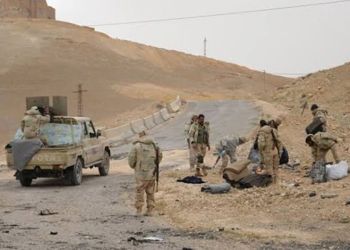This post is also available in:
![]() العربية
العربية
Siege and starvation warfare and daily intense airstrikes are no longer the only components of the sufferings of the civilians in Deir Ezzor. A new suffering, which is no less dangerous and devastating than the others, has appeared recently. It is embodied in the spread of infectious diseases, which are now threatening the entire population in the province, including children, amid deteriorating health care, lack of medical cadres and the absence of any medical organization specialized in vaccination campaigns.
Polio is considered amongst infectious diseases. It affects the nerves of the patient, resulting in his disability or death. It spreads between people through direct communication with the infected person, nasal mucus and water and food which are polluted with the virus. Then, the virus enters from the mouth or nose, and starts multiplying in the neck and stomach. Then it dominates the body after merging with blood.
DeirEzzor 24 interviewed Dr. Imad Mustapha, one of the main founders of the anti-polio vaccination campaigns in Deir Ezzor in recent years, who provided us with new information about the return of polio in the province.
He said, ‘
‘The first case of polio appeared in the Sabikhan city, and surrounding villages in the eastern countryside of Deir Ezzor, in the the mid of 2013. At that time, I contacted some of my colleagues, who were working in medical organizations and had a link of communication with the UNECEF and the World Health Organization, and told them about suspected cases of polio. Afterwards, they sent a team consisting of members from different organizations who visited and examined several cases, and sent the samplers to Turkey, which were later transported to laboratories run by the ‘WHO’.
After a while, ten suspected cases of polio were tested positive.
In the beginning of 2014, we began anti-polio vaccine campaigns during which we vaccinated children every month until the arrival of Daesh in the province, which halted our campaigns for several months later. In 2015, the organization allowed the vaccine to take place in certain areas of the province only. The medical cadres were not permitted to operate in Al-Bukamal since it belongs to the ‘Furat State’. However, the emir of the region allowed some campaigns which did not cover 30 percent of the population of the city.’
The doctor stated that it is impossible to overcome polio by stable campaigns, the doctors must carry out house to house campaigns.
In July 2016, the organization stopped the vaccination campaigns. Since then, not only single campaign has been recorded. In February 2017, polio started to appear in the Sabikhan city and surrounding villages. I contacted some of my friends who informed me about the emergence of new polio cases in the towns of Al-Bulayl, Buqrus, the Sur area and the Kassrah. However, it is concentrated in the Sabikhan and surrounding villages, where more than 36 cases have been documented.
It is known that with every case of polio, there is a risk of the spreading of the disease between more children. Doctors say that the effective method to put an end to the illness is to carry out house to house vaccine campaigns in the province, which necessitates an approval from the organization.
It should be noted that Daesh had realized the danger of the situation and carried out a vaccine campaign two weeks ago. On May 28, 2017, they will launch another one. However, they will use a vaccination which has been stored in their medical centers since the year of 2016. I received a picture of the vaccination. They are using a third-degree vaccine, which might worsen the situation of the patients. What must be done in the province today is to vaccine children whose ages range from one day to five years, and that they must be kept in the province so that they do not infect other children living in other Syria provinces.
He summed up the interview by saying, ‘ I do not think that the vaccinations, which are being carried out by Daesh, will do any good for the infected children. The vaccination necessitates more procedures which the organization cannot handle for lack of experience. In such a situation, the vaccines will only prevent other children from being infected, while the infected remain the same.’










